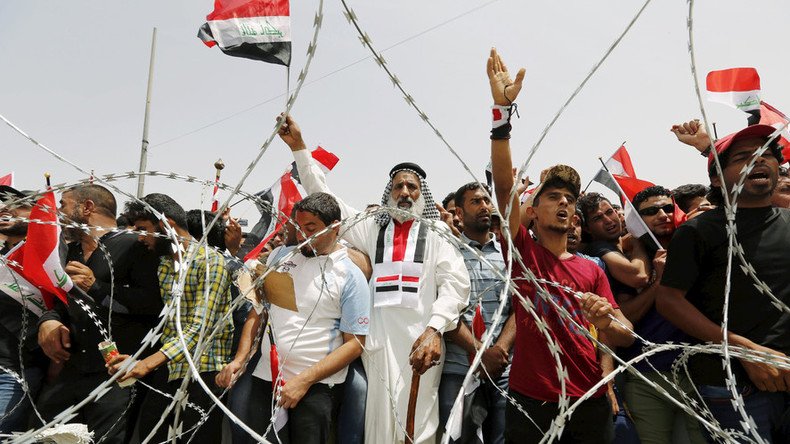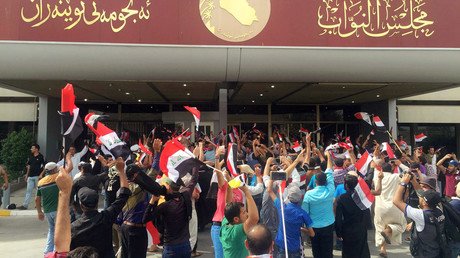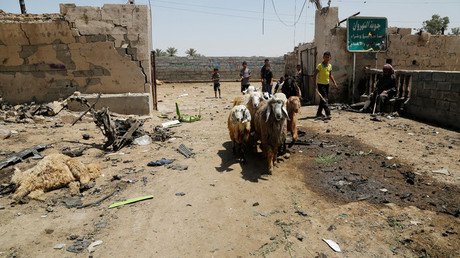‘Iraq crisis: Consequence of US regime change strategy’

The problem with the US’s regime change strategy is that after a leader in a country as delicate as Iraq is removed, there are an infinite number of things that could possibly go wrong, says Max Abrahms, assistant professor at Northeastern University.
A state of emergency was declared in Baghdad on April 30 after hundreds of supporters of Iraqi Shiite cleric Moqtada al-Sadr stormed Baghdad’s Green Zone and entered the parliamentary building. Iraqi security forces used tear gas against protesters and shot bullets into the air.
The US says it is concerned the political crisis in Iraq will have a negative influence on the fight against Islamic State (IS, formerly ISIS/ISIL).
“…At a time when they're still fighting Daesh [Arabic name for Islamic State, ISIS/ISIL], Mosul is still under ISIL control. At a time when, because of low oil prices, they've got challenges with respect to their budget. There's a dam that needs to be fixed. They've got a lot on their plate. Now is not the time for government gridlock or bickering,” US President Obama told a media conference during his visit to Riyadh on April 21.
Earlier in the week, US Vice President Joe Biden visited Iraq. The meeting was held in secret, but it's reported it was about solving the country's political crisis.
RT asked experts whether Washington can really solve the problem now, given the current situation.
According to Max Abrahms, assistant professor of political science at Northeastern University, “The obvious answer is no.”
“This is one of the big problems with the strategy of regime change. The US and other countries are able to effectively remove the leader, but it is a little bit like Humpty Dumpty in terms of putting the pieces back together again. After you remove the leader, especially in the country as delicate as Iraq, there is literally infinite number of things that could possibly go wrong. One of the main problems historically in Iraq… is sectarian discord. And it is a very sensitive balance,” he said.
“The US, on the one hand, is responsible, to an extent, for the unrest that has followed the removal of Saddam Hussein. But on the other hand, the US is not in a very good position to affect a political climate on the ground. And this comes at a particularly bad time for the US and frankly, the broader international community, because we have seen some signs of progress in Iraq as well as in Syria in terms of combatting ISIS,” Abrahms said.
The US is in an uncomfortable position as it has good relations with the Iraqi government, which is increasingly unpopular with the country’s population, Abrahms said.
“The likely alternative to this government, although it would be more popular presumably in Iraq, would have worse relations with the US. Indeed, Sadr is an important Shia cleric, he is a political leader but he is also the leader of militia there – he is a military leader. And historically the US has really conflicted with his militia – the Mahdi army in Iraq was one of the main problems to the post-Saddam Hussein occupation there. So, there is no love lost between Sadr and the US government. And increasingly he seems to be a real threat to the current government,” he added.
Ray McGovern, former CIA officer says: “The key element here is that Moqtada al-Sadr has the real power in Baghdad and in most of Iraq.”
“Nine years ago he was very clever…He got out of town when it became clear that president [George W.] Bush didn’t want to lose the war before he departed from office. And so he had a so-called surge. And the surge came and cleaned out a whole bunch of people. Moqtada al-Sadr was just happy to be out of town during that purge. What happens now? The ostensible reason of the surge was to make sure that Shia and Sunni could work out a reasonable agreement to govern together. That was never achieved and instead Moqtada al-Sadr waited his time and now he is in with the power as he says to ruin this government,” he told RT.
The Iraqi government is “totally corrupt” and the Iraqi people have had enough of that, said McGovern.
“What Moqtada al-Sadr said: ‘Look, we need to change this and the parliament can’t change it.’ Then, wonder of wonders - the Greene Zone is breached, the parliament is entered and we have a totally new situation,” he added.
In McGovern’s view, the situation cannot be repaired “by the likes of Joe Biden or John Kerry or anyone else”; it is a direct result of the failure of the surge in 2007.
“And what will happen now is that the Shia will get together and make sure that [Iraqi Prime Minister] Abadi either obeys their diktat or is removed,” he said.
“I am sure that Biden and the others will be saying: ‘Oh, no. We have to really get together and make sure we work together.’ But they are nine years late on that. And the surge that inserted 30,000 US troops to save the situation for Bush and Cheney… The the reason given was to get Sunni and Shia cooperating with each other to form a viable government. That was never the real reason. The real reason was simply to prevent what’s happened now from happening before Cheney and Bush left office. That was a terribly cynical move. Robert Gates was the key player together with… David Petraeus,” the expert believes.
The statements, views and opinions expressed in this column are solely those of the author and do not necessarily represent those of RT.














